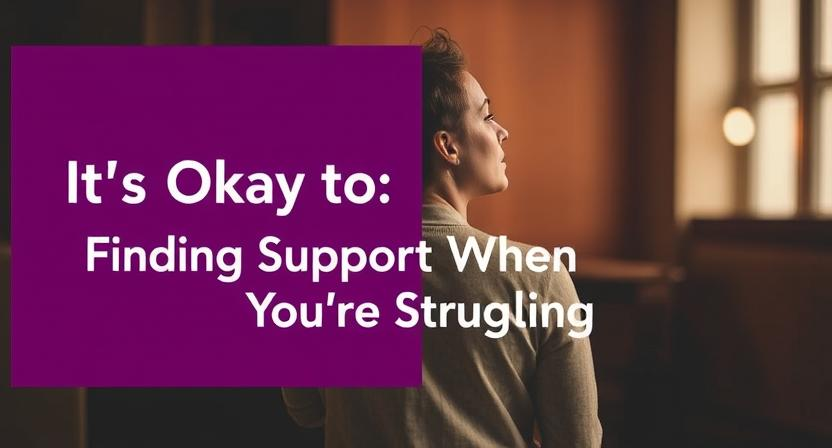In a world that often demands perfection, it can feel like a failure to not be okay. Society has ingrained in us the idea that we must always be happy, productive, and successful. However, the reality is that life is filled with ups and downs, and it’s completely normal to go through periods when things feel difficult. It’s okay to not be okay. In fact, acknowledging that you’re struggling is the first step toward healing and finding the support you need to move forward.
Mental health struggles, whether caused by external pressures or internal battles, are not a sign of weakness. They are part of the human experience. The most important thing is to recognize when you’re struggling and take steps to find the support you deserve. In this article, we’ll discuss why it’s okay to not be okay and explore the different ways to seek support when life feels overwhelming.
The Pressure to Be Okay
In a culture that often promotes “hustle” and the idea of always being on top, many people feel like they must keep their struggles hidden. Social media, in particular, can amplify this pressure. We’re bombarded with idealized versions of other people’s lives—highlight reels of success, happiness, and perfection—which can make us feel like we’re falling short when we’re not okay.
This societal pressure can lead to self-stigma and prevent individuals from acknowledging their mental health struggles. People often push through feelings of sadness, anxiety, or stress, hoping they will disappear on their own. Unfortunately, this approach doesn’t help; in fact, it can make things worse in the long run.
The truth is, it’s completely human to feel overwhelmed or down sometimes. Everyone goes through challenging moments, whether they involve work stress, relationship issues, personal losses, or emotional burnout. The important thing is to give yourself permission to acknowledge that you’re not okay—and to seek support to help you navigate these tough times.
Why It’s Important to Accept That You’re Not Okay
Emotions are part of being human. Trying to suppress or ignore them can lead to negative consequences such as stress, anxiety, and even physical health problems. Research has shown that bottled-up emotions can affect your immune system, increase your blood pressure, and contribute to heart problems. Accepting that you’re not okay can help alleviate some of this stress and protect your overall health.
When you allow yourself to feel what you’re feeling, you create space to process those emotions. Denying or avoiding difficult feelings can make them fester, turning a small issue into a much larger one. By acknowledging your struggles, you take the first step toward addressing them and finding solutions.
Admitting that you’re not okay also reduces the shame and guilt that can come with it. It’s okay to not feel okay, and seeking help is a brave and important step toward healing. You don’t have to go through tough times alone—support is available, and it’s okay to ask for it.
Finding Support: You Don’t Have to Struggle in Silence
The next step after admitting that you’re struggling is to find support. While it might feel intimidating at first, reaching out for help is a crucial part of the healing process. Here are some ways to find the support you need:
1. Talk to a Trusted Friend or Family Member
The first place many people turn when they’re struggling is their support network. Sharing your feelings with a trusted friend or family member can be incredibly cathartic. Sometimes, just having someone listen to you without judgment can make all the difference.
It’s important to have people in your life who understand that it’s okay to not be okay. If you don’t feel comfortable talking to a close friend or family member, consider expanding your network of support. You might have a co-worker, acquaintance, or mentor who can offer a listening ear and perspective.
Remember, the goal isn’t necessarily to have someone offer a solution; it’s about expressing how you feel and feeling heard and supported.
2. Seek Professional Help
There’s no shame in seeking help from a therapist, counselor, or mental health professional. If you’re feeling overwhelmed, depressed, or anxious, a trained professional can help you work through your emotions in a safe and structured environment. Therapy isn’t just for people with severe mental health disorders; it’s for anyone who wants to improve their emotional well-being and learn healthier ways of coping with life’s challenges.
Therapists can offer a variety of therapeutic techniques, such as Cognitive Behavioral Therapy (CBT), psychodynamic therapy, or mindfulness-based approaches, all of which can help you gain insight into your emotions and develop strategies for managing them.
If you’re not sure where to start, consider asking for recommendations from a trusted individual or doing research to find a therapist who specializes in the areas you’re struggling with. Many therapists now offer virtual sessions, which can make it easier to access care from the comfort of your own home.
3. Join a Support Group
Support groups offer a sense of community for individuals facing similar challenges. Whether it’s a group for people with anxiety, depression, grief, or addiction, these groups provide a safe space for individuals to share their experiences and receive support. Knowing that you’re not alone in your struggles can be incredibly comforting.
Support groups are often led by a trained facilitator but may also be peer-run. These groups can be in-person or virtual, depending on what’s most convenient for you. A quick online search or asking a healthcare professional can help you find a group that meets your needs.
4. Online Communities and Resources
If you don’t feel ready to talk to someone in person, online communities can offer a valuable source of support. There are numerous forums, social media groups, and websites where individuals share their mental health journeys and provide encouragement to one another. These online spaces often feel less intimidating because you can remain anonymous and participate at your own pace.
Many mental health organizations, such as the National Alliance on Mental Illness (NAMI) or Mental Health America (MHA), offer resources and support networks that can connect you to online communities. Additionally, apps for mental health support, such as BetterHelp or Talkspace, allow you to communicate with therapists and counselors from the comfort of your home.
5. Practice Self-Compassion
In addition to external support, learning to offer yourself kindness is a critical component of healing. When you’re struggling, it’s easy to be hard on yourself, thinking that you should “snap out of it” or “get it together.” However, this self-criticism only prolongs the pain.
Self-compassion is about treating yourself with the same kindness and understanding that you would offer to a friend. When you’re struggling, remind yourself that it’s okay to not be okay. Practice mindfulness, take care of your physical health, and engage in activities that bring you comfort and joy. Small acts of self-care, such as getting enough rest, taking walks, or practicing relaxation techniques, can have a significant impact on your emotional well-being.
Taking the First Step Toward Healing
The most important thing to remember is that you don’t have to suffer in silence. Seeking support when you’re struggling is a brave and necessary step toward healing. Whether it’s talking to a friend, joining a support group, or seeing a professional, there are countless ways to get the help you need.
It’s okay to not be okay. Acknowledge your struggles, reach out for support, and give yourself permission to heal at your own pace. You are not alone, and there are people who care about you and want to help you get through tough times.
Mental health is just as important as physical health. By seeking help and finding the support you need, you’re taking an important step toward regaining your strength, resilience, and well-being. So, take a deep breath, and remember—it’s okay to not be okay.






Leave a Reply